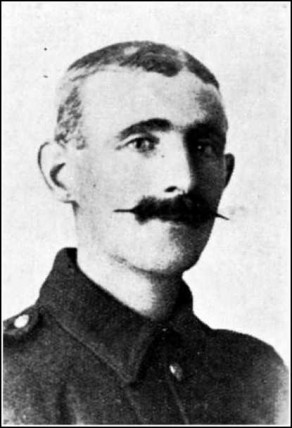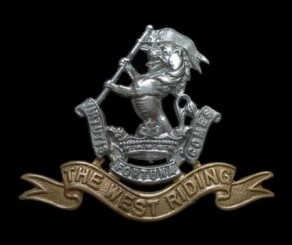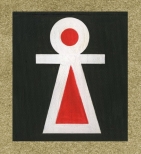
14 January 1916
AUSTWICK - FROM THE FRONT
Sergt. Arthur Booth, of the 6th West Ridings, has reached home from the front. He joined the Territorials in 1909 and was called up at the outbreak of war. After training he proceeded to the front on April 17th 1915, and has been there about nine months. He is now a time expired man. Sergt. Booth has had experiences in the trenches and has seen his comrades fall, but he himself has not received a scratch.
28 July 1916
AUSTWICK
Sergt. Arthur Booth, of the 6th West Riding Regiment (T.F.), whose time expired a few months ago, has rejoined the Army and left Austwick on Tuesday for Clipstone. Sergt. Booth has seen a good deal of service in France.
05 January 1917
AUSTWICK - SOLDIERS' THANKS
The following soldiers have written and expressed sincere thanks to the parishioners of Austwick and Lawkland for the parcels sent to them this Christmas:- Sergt. A.M. Booth, Pte. T. Fell, Pte. T. Redmayne, Pte. H. Capstick, Pte. J. Harrison, Pte. J.W. Kirkbright, Gunner J. Moss, Signaller A.H. Proctor, Sergt. H. Shuttleworth.
The following is an extract from a letter from France from Sergt. A.M. Booth:-
"Thanks for parcel safely received. I greatly appreciate your kindness, and all who have helped and thought of me. I am one of the luckiest chaps out here. I seem to have a charmed life. The last time I was in the shell holes in 'No Man's Land' the Germans started shelling and blew me out of one hole and into another. I am like a cat - I landed on my feet very little the worse for my experience."
12 October 1917
AUSTWICK - SERGEANT A. M. BOOTH REPORTED MISSING
Official notification has been received by Mr. and Mrs. J. Booth, Sunny Bank, that their sixth son, Sergeant Arthur Metcalfe Booth, West Riding Regiment, has been missing since an engagement in France on the 28th-29th August. Sergeant Booth, who is 33 years of age, was called to service at the outbreak of war, he being in the West Riding Territorial Regiment. He went to France on the 14th of April 1915, and returned to England in January 1916, his time of service having expired. After being in civil life nine months he was again called to the Colours and went to France on September 22nd 1916. He has three brothers serving in France. Before the war he was employed on the Ingleborough Estate, Clapham.
30 November 1917
AUSTWICK - Local Soldiers Missing
Much anxiety is felt in the village as to the fate of two local soldiers, viz., Sergt. Arthur Booth, and Second-Lieutenant H. T. Styles, M.C., Manchester Regiment.
The career of Lieut. Styles has been a successful one. He enlisted on the outbreak of war in August 1914 in the Cheshire Regiment, and was promoted step by step from the ranks to Company Sergt.-Major. After 15 months' active service on the Western Front he was offered and accepted a commission, and came to Trinity College, Oxford, for training. He was gazetted in the Manchester Regiment, and went to France again in July last. In August he was recommended for the Military Cross for gallant and soldierly conduct in a very successful attack on the Western Front between the 18th and 22nd August. He was reported wounded on October 22nd, and his wife has since been notified that he has also been missing since that date. Attempts have been made to get news of him from fellow officers, but without avail. Much sympathy is extended to his parents and young wife in their great anxiety.
Sergt. A. Booth, a very well known local soldier, has been missing since an engagement on the 27th and 28th August. His officers state that he was cut off from his battalion and has not been seen or heard of since.
18 January 1918
BOOTH - Presumed killed, 27th-28th August, 1917, Sergeant A. M. Booth, West Riding Regiment, fifth son of Mr. and Mrs. John Booth, Sunny Bank, Austwick, aged 33 years.
18 January 1918
AUSTWICK - SERGEANT A.M. BOOTH REPORTED KILLED
Mr. and Mrs. Tom Booth, Sunny Bank, have been officially notified that their fifth son, Sergeant A. M. Booth, of the West Riding Regiment, previously reported missing since an engagement in France on the 27th-28th August, was killed or died of wounds on or shortly after that date The Military Authorities report his burial to have taken place on November 4th, 1917. Sergeant Booth, who was 33 years of age, was called up with the Duke of Wellington's (Territorials) on the outbreak of war. He went to France 14th April, 1915, and returned time expired in January, 1916. After being in civil life for nine months, during which time he was employed on the Ingleboro' Estate, he was again called to the Colours, and returned to France on September 22nd, 1916. Sergeant Booth was of a very cheerful disposition, highly respected in the district, and a very keen soldier. The heartfelt sympathies of the people of this district are extended to his aged father and mother and to the family in their sad loss. Three other brothers are also serving in H.M. Forces.
25 January 1918
AUSTWICK - DEATH OF A NOTABLE MUSICIAN
We regret to announce the sudden death from apoplexy, on January 17th, of Mr. John Booth, violinist, of Sunny bank. The deceased gentleman was in his 73rd year, and his death removes from us a very highly respected and well-known resident. Mr. Booth was born at Colne in 1846, and as a boy was a chorister in the Parish Church choir, and from that period worked his way to the top of his profession. He was the leading musician in Colne and Burnley for many years, and was the first violin teacher in the latter town.
For many years in the eighties he held a leading position as a teacher in the musical profession in the West Riding, and also in North-East Lancashire. For 24 years he had lived at Austwick, during the earlier period of which he was music master at Sedbergh, Giggleswick and Skipton Schools and also leader of the Settle Choral Society. He had a large teaching connection, and many of his pupils have obtained high rank in the musical profession, notably Mr. A. Pollard and Ernest Romaine O'Malley, of Burnley. He was also a connoisseur of old violins, his advice often being sought by collectors. For the last 10 or 15 years he had been practically retired. He leaves a widow, three daughters, and six sons (three of whom are serving in H.M. Forces.) His death came as a great shock, as he had been a robust and healthy man, never having been attended by a doctor, and is attributed to grief over the loss of his fifth son Arthur, who had been reported killed in action. The interment took place at Winewall, near Colne, on Tuesday.
22 February 1918
INGLETON - IN MEMORY OF THE FALLEN
A memorial service for Ingleton men who have fallen in the war was held in St. Mary's Church on Sunday evening. There was a large congregation, and the service was of an impressive character. The Union Jack was hoisted half-mast on the tower during the day. At the commencement of the service the organist, Mr. C. Bentham, played 'O rest in the Lord', and at the conclusion the Dead March in 'Saul', 'How bright these glorious spirits shine', and other hymns appropriate to the occasion were sung, as was also the National Anthem. Standing on the Chancel steps, Bugler J. Robinson sounded the 'Last Post', and its solemn and eerie notes reverberated along the aisles.
Before commencing his address, the vicar, the Rev. D. T. Davies, read out the list of those who had fallen, as follows:-
Killed in action: Second-Lieutenant G. Kirk, Sergeant J. Metcalfe, Privates A. Noble, G. Scholey, C. Tomlinson, J. Smith, W. A. Hodgson, J. W. Wadeson, J. W. Robinson, J. Clapham, W. Smith, J. Schofield, J. Kettlewell, W. Marklew, E. Askew, P. Fletcher, G. Metcalfe, A. M. Booth, J. Woodhouse, W. Bolton, and J. [W.H.W.] Wilson.
Died in hospital: Privates W. H. Wignall and C. Newsholme.
Torpedoed: C. Grant.
Missing; Sergeant R. E. Walker, Privates A. Sherwin, W. Northey, E. Robinson, J. Saul, and W. [J.C.] Bradford.
The Vicar, speaking from the words, 'Greater love hath no man than this, that a man lay down his life for his friends', said that the occasion brought them face in face with a question that was momentous to everyone, and the list which he had just read made them pause and ask the question, "Is the cause for which we are fighting of such a nature that these sacrifices are necessary?" They must remind themselves of the causes which led to the war. Our honour was pledged to protect a small country from an oppressing wrong, and we were compelled to stand by them. They were standing to protect a weak country from a fearful wrong committed by one of the strongest nations in the world - from a military point of view the strongest - a nation that was steadily prospering year after year and which had been training its manhood to satisfy its mad ambition for power. It was becoming clear, especially during the last few weeks, that the dominant note running through their proposals had been their determination that might should conquer over right, and that they would rule as masters over the whole world. When they analysed the causes they saw that the principles of justice and righteousness were struggling against oppression and wrong-doing. They had seen an attempt to impose injustice on the whole world, to impose the doctrine that might is right and mercy unknown by the will of one man, and to sweep away religion, man's guidance, in a moment.









No comments yet.